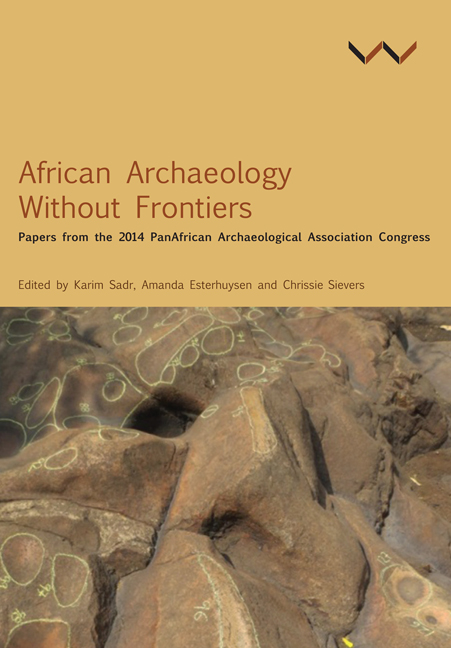 African Archaeology Without Frontiers
African Archaeology Without Frontiers Book contents
- Frontmatter
- Contents
- Acknowledgements
- List of Figures and Tables
- Introduction: An Invitation Fulfilled
- Keynote Address 1: Imagining an African Archaeology Without Frontiers
- Keynote Address 2: A Continental Vision for African Archaeology
- 1 The ‘Useable’ Archaeology of African Farming Systems
- 2 Defining Cultural Heritage among the Makonde of Tanzania
- 3 The Indigenous Roots of Swahili Culture in Pangani Bay, Tanzania
- 4 Is This an Anvil? Iron Bloom Crushing Sites in Northern Togo
- 5 L'art Rupestre au Cameroun, Nouvelles Découvertes et Contribution à L'iconographie Sous-Régionale
- 6 Archaeology and History in Iron Age Settlements in the Congo Basin
- 7 Learning from Glass Trade Beads at Thabadimasego, Botswana
- 8 Blurring Boundaries: Forager–Farmer Interactions in the Middle Limpopo Valley
- 9 Heritage Management and the World Wide Web: South African Challenges
- Contributors
- Index
1 - The ‘Useable’ Archaeology of African Farming Systems
Published online by Cambridge University Press: 15 March 2018
- Frontmatter
- Contents
- Acknowledgements
- List of Figures and Tables
- Introduction: An Invitation Fulfilled
- Keynote Address 1: Imagining an African Archaeology Without Frontiers
- Keynote Address 2: A Continental Vision for African Archaeology
- 1 The ‘Useable’ Archaeology of African Farming Systems
- 2 Defining Cultural Heritage among the Makonde of Tanzania
- 3 The Indigenous Roots of Swahili Culture in Pangani Bay, Tanzania
- 4 Is This an Anvil? Iron Bloom Crushing Sites in Northern Togo
- 5 L'art Rupestre au Cameroun, Nouvelles Découvertes et Contribution à L'iconographie Sous-Régionale
- 6 Archaeology and History in Iron Age Settlements in the Congo Basin
- 7 Learning from Glass Trade Beads at Thabadimasego, Botswana
- 8 Blurring Boundaries: Forager–Farmer Interactions in the Middle Limpopo Valley
- 9 Heritage Management and the World Wide Web: South African Challenges
- Contributors
- Index
Summary
Abstract
Rural African farming has often been viewed as ephemeral, shifting cultivation with low output and high unreliability. At the same time, it is often understood as static and relatively unchanged for centuries. More recent historical and archaeological studies of African ‘intensive’ farming systems have challenged this narrative, yet detailed analyses of such systems and the potential to draw ‘lessons’ from them for the future remain limited and restricted to relatively few locations. This paper presents an overview of a new research network designed to share and generate insights into African farming systems across the continent. The network links projects in Kenya (Marakwet), Nigeria (Tiv) and South Africa (Bokoni) in an attempt to develop comparative and pan-African approaches, as well as build unique research capacity, experience, approaches and knowledge in Africa and for Africa. In the paper we introduce each of the partner projects and the specific interdisciplinary and locally engaged approaches under development. We highlight some of the main theoretical and methodological issues addressed by the network, including diachronic approaches to physical geography (soils, water, vegetation), demography (population densities, settlement patterns), farming practice (crops and crop regimes, fallowing, fertility), regional exchange (reciprocity, market exchange, related pastoral systems), broad cultural changes (the nation/region, governance, religion), land tenure (kinship and inheritance, land law), landscape (mapping, perception, temporality), challenges of integrating science and humanities disciplines (social anthropology, landscape archaeology, geo-archaeology, archaeo-botany, paleo-ecology) and local community engagement (public anthropology/archaeology, indigenous knowledge).
Introduction
Most archaeological research into African farming has tended to focus on origins, domestication and spread (see Lane 2004; Casey 2005; Neumann 2005; Manning et al. 2011), with comparably less emphasis on recent developments, diversification, specialisation and intensification (although see Widgren & Sutton 2004 for an exception). Diverse bodies of research are, however, demonstrating how Africa's present-day environments are the products of deep human engagements with nature (such as Johnson & Anderson 1988; Leach & Mearns 1996), and how these complex, recursive human– environment histories must be understood if we are to effectively manage the present and plan for the future (see Lane 2011; Davies 2012; Marchant & Lane 2013; Stump 2013). This process involves understanding the ongoing environmental trends that extend across the pre- to the postcolonial (Davies 2012, 2013: 21–22), alongside deeper understandings of indigenous knowledges and technologies (Lane 2011; Stump 2006, 2013; Davies et al. 2014a, b).
- Type
- Chapter
- Information
- African Archaeology Without FrontiersPapers from the 2014 PanAfrican Archaeological Association Congress, pp. 1 - 31Publisher: Wits University PressPrint publication year: 2016


